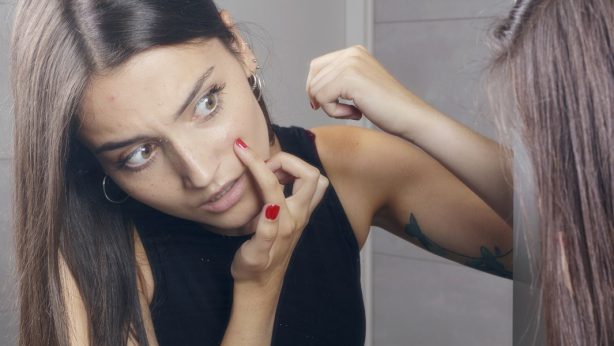Acne is a problem that can affect both teenagers and adults. It is difficult to deal with it, but it is possible with appropriate treatment and a bit of patience. I say treatment because acne is considered a disease, and not just an aesthetic defect. For this reason, you should see a dermatologist in the first place. What are the symptoms of acne and how to treat it? In today’s post, you’ll find the ways for acne treatment that I recommend.
Symptoms of acne
Symptoms of acne vary depending on the severity of the disease:
- Blackheads are the initial stage of acne. You know what they look like: white or black dots. Blackheads appear on the face, arms, cleavage or back, that is where the largest amount of sebaceous glands are located.
- Pimples are an average form of acne. They manifest themselves in convex, reddish lesions on the skin that indicate the development of inflammation around the sebaceous glands.
- Red pustules filled with pus is a severe stage of acne. The infection includes deeper layers of skin, and deep cysts leave permanent scars.
Remedies for acne
Treatment prescribed by dermatologists (ointments, antibiotics, and vitamin A)
A visit to a dermatologist is the best way to permanently get rid of acne. Remember that therapy requires patience – an improvement of skin condition can occur even after several months. What treatment is usually offered by a dermatologist?
The doctor can prescribe antibacterial ointments and gels for moisturizing skin lesions that facilitate the purifying of sebaceous glands and limit sebum production. The most popular formulations include those that contain all-trans vitamin A (tretinoin) or its derivatives. The doctor’s instructions should be followed very carefully as they may cause side effects, for example, irritate the skin or increase its sensitivity to light. Also, a dermatologist may recommend antibacterial preparations based on azelaic acid or benzoyl peroxide. Applying creams with zinc oxide can also bring good results. Such creams are usually recommended for mild forms of acne and supportive in more severe stages.
If the inflammation has developed, an ointment or gel with an antibiotic, for example, clindamycin or erythromycin, is necessary. It relieves symptoms and prevents the formation of new breakouts.
If you suffer from a severe form of acne, which manifests itself as a rash of pustules and the risk of permanent scars on the skin, the dermatologist will prescribe not only gels and creams but also an oral antibiotic, usually tetracycline. In the most severe cases, retinoids, i.e. drugs containing isotretinoin (a derivative of vitamin A acid) are used. These preparations are very effective, because they inhibit the secretion of sebum and fight bacteria, and as a consequence, prevent inflammation and minimize the risk of recurrence. On the other hand, they do not remain indifferent to health, therefore during the treatment, periodic blood count is necessary, which will determine the concentration of liver enzymes and the level of pancreatic lipids.
Hormonal contraception for acne
If the dermatologist suspects that disturbed sex hormones are responsible for acne lesions, they will direct you to the gynecologist-endocrinologist for further consultation. In such cases, the patient usually complains of irregular menstrual cycles or excessive hair growth in atypical areas. Most likely, these symptoms are the result of increased production of male hormones (testosterone) stimulating the work of sebaceous glands. If blood tests confirm this assumption, you will start a treatment that is based on oral contraceptives with progesterone and estrogen.
Hormonal acne treatment
The indication for hormonal treatment of acne is the abnormal level of androgens in the blood. It is preceded by many studies and consultations. If you do not agree to oral medications with a strong effect, you can go for local treatment. It requires regularity and lasts a minimum of several weeks needed first for improvement and then to sustain the effect. Drugs are prescribed and selected according to the type of acne lesions. The therapy will be supported by chemical exfoliating treatments (scrubs with almond, pyruvic or glycolic acid). However, keep in mind that mechanical face cleaning is not allowed!
Professional acne treatments (microdermabrasion, laser, and exfoliating scrub)
In the treatment of acne, combining several methods is a common and effective approach – this gives a greater guarantee of a permanent solution to the problem. For this purpose, the dermatologist often offers treatments that stimulate skin cells to renew. Thanks to this, acne changes disappear faster and the skin becomes smoother. I especially recommend the following treatments:
- medical scrub using mandelic, glycolic, pyruvic acid or TCA,
- kriopeeling (freezing infected tissues with liquid nitrogen),
- microdermabrasion (mechanical abrasion of horny tissues using special equipment).
Moreover, laser treatments are aimed not at treating acne as much as removing acne scars.
What remedies do you recommend for acne, and which methods do you think are ineffective? I am waiting for your opinions! Let me know in the comments!




Leave a Reply